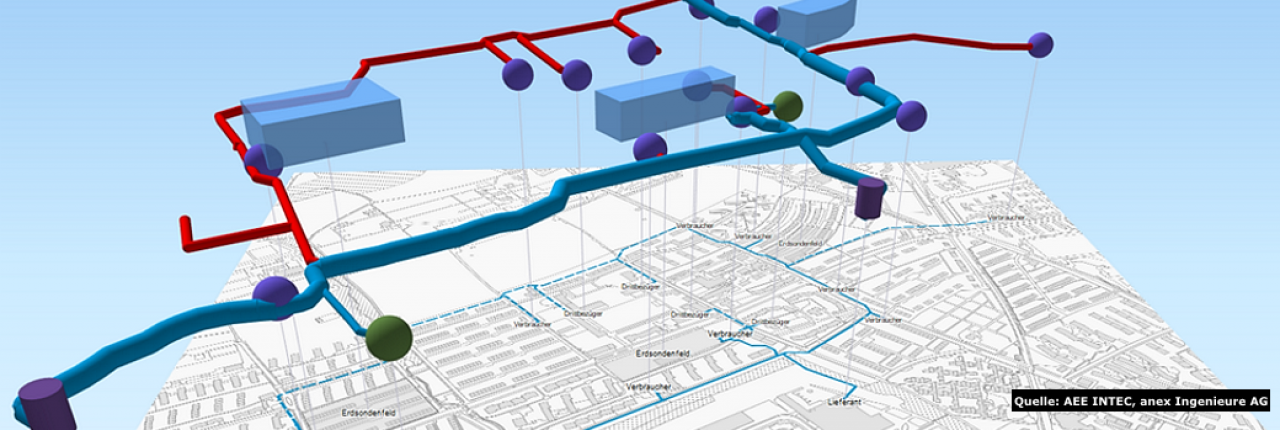DeStoSimKaFe – Concept development & coupled deterministic/stochastic evaluation of cold district heating for heating & cooling supply

51% of the primary energy demand of the EU is currently used for heat and cold supply with a major increase in cooling demand expected for the coming decades. To achieve the goals of the COP21 agreement, steps towards a complete decarbonization of our heat and cold supply are mandatory and have to be initiated now to become effective in due time.
District heating and cooling are recognized as key technologies in this regard as they enable a smart integration of renewables, waste heat, thermal storage and consumer while providing a cross-sectoral (with electricity and gas) and cross-infrastructural (with waste water and industrial waste heat) linkage, leading to increased overall efficiencies and effectiveness and reduction of primary energy demand.
Cold district heating and cooling (CDHC) systems with a supply temperature of <30°C a) enable an easy integration of low-exergy sources like waste heat and renewables, b) minimize transport losses, c) significantly reduce primary energy demand compared to state-of-the-art solutions and d) are able to supply heat and cold with one infrastructure. Innovative grid topologies allow here for a high degree of flexibility in regard of supplying existing and newly built buildings, system extension as well as integration of new thermal sources respectively sinks and storages. First demonstration systems in Switzerland are proof for the potential of this technology and concept.
To access the full potential of this concept and to establish it as the go-to solution for heat and cold solutions due to its inherent characteristics of easy integration of low-exergy sources, flexible expansion options and supply of older buildings, basic knowledge and methods on operation, planning and evaluation have to be extended to allow for a complete and holistic development and evaluation of such systems. Currently, a lack of knowledge exists here in regard of a) technical and economic evaluation methods, b) methods for the development of complete system solutions including suitable business models, c) minimal requirements, area of application and limitations and d) sound measures for the long-term evaluation of CDHC concepts.
This project aims for improving the overall applicability of innovative and sustainable heat and cold supply based on CDHC concepts by concentrating and combining international and national expertise and practical experiences and by establishing the necessary basics in conceptualization, planning and long-term evaluation. This is achieved by a) evaluation of possible system solutions for different configurations and boundary conditions, b) development of a multi-domain co-simulation framework for evaluation of technical and economic benefits, c) development of a stochastic approach for long-term system evaluation in regard of changing external and internal factors and d) development of economic evaluation method for CDHC including archetypal business models and new services.
The results of this project are highly relevant for the further development and decarbonisation of Austrian district heating and cooling systems. Furthermore, they will support and enable the realization of innovative and sustainable thermal supply concepts based on low temperature sources. The consortium consists of a highly capable and interdisciplinary scientific team and experienced industrial partners, among the inventors and planners of the Swiss CDHC concepts. Renowned energy suppliers, cities and municipalities as well as founding agencies actively support this research project.
Das Projekt wird vom Österreichischen Klima- und Energiefonds im Rahmen des Energieforschungsprogramms 2017 gefördert.
Poster:
Autoren: Lorenz Leppin, Hermann Edtmayer, Harald Schrammel, Ingo Leusbrock
Titel: Low Temperature and Cold District Heating & Cooling Systems
Art: Projektvorstellung
Präsentation:
Autor: Harald Schrammel
Titel: Konzeptentwicklung & gekoppelte deterministisch/stochastische Simulation und Bewertung Kalter Fernwärme zur Wärme- & Kälteversorgung
Art: Projektvorstellung Science Brunch, 11.03.2019, Wien
Artikel:
Titel: Umfassende Untersuchung und Bewertung von Anergienetzen
Autoren: Michael Salzmann, Lorenz Leppin, Harald Schrammel, Ingo Leusbrock
Art: Artikel, Nachhaltige Technologien 03/2020
Artikel:
Titel: Konzeptentwicklung und deterministisch/stochastische Bewertung kalter Fernwärme
Autoren: Hermann Edtmayer, Harald Schrammel, Lorenz Leppin, Ingo Leusbrock
Art: Artikel, Nachhaltige Technologien 04/2018
Customer
The project is funded by the Austrian Climate and Energy Fund within the energy research program 2016 executed by FFG
Project coordination
AEE INTEC